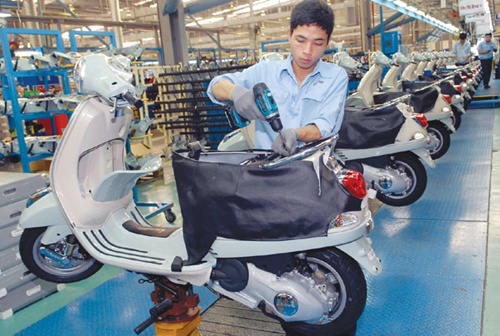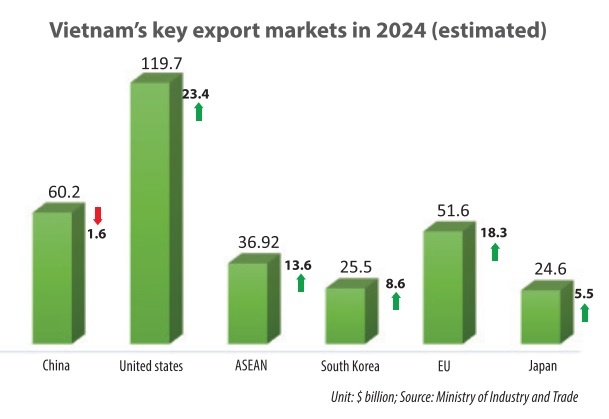Vietnamese firms find it hard to break into European market with new FTA
 |
| A worker assembles a scooter at Vinh Phuc Province's Piaggio Viet Nam Co Ltd. VNA/VNS Photo Danh Lam |
Speaking during an online dialogue at the Government website chinhphu.vn, Nguyen Hoai Nam, Deputy General Secretary of Viet Nam Association of Seafood Exporters & Producers (VASEP), spoke of the obstacles facing the local fisheries sector in a discussion on FTA Viet Nam-EAEU, in a bid to help businesses take advantage of opportunities.
The EAEU, which includes Russia, Armenia, Belarus, Kazakhstan and Kyrgyzstan, was launched in January to promote trade and economic integration between all parties. The market has a combined population of 182 million people and a gross domestic product of some US$2.2 trillion.
Notably, this is a market with rich natural resources, such as oil, coal, iron and ore. In the past, Viet Nam has exported key items to this market, including spare phone parts, computer-electronic products, textiles and garments, footwear, seafood, coffee, cashew nuts, rice, and vegetables. In addition, Viet Nam imports petroleum products, steel, fertilizer, machinery and equipment from this block.
After the FTA between Viet Nam-EAEU comes into effect, some 53 per cent of total tariff lines will be slashed to zero per cent, creating more export opportunities for Vietnamese enterprises. However, the problem remains in how to fulfill rules of origin and food safety. By doing so, Vietnamese businesses can take advantage of the preferential tariff regime agreement.
Nam said that over the years the Vietnamese seafood industry had always considered Russia and this region as a special consumption market, and this was a market with significant potential. The penetration into this market has posed many challenges. As a result, seafood export values were not high, reaching about US$106 million to $110 million per year, and measuring just over 1 per cent of the total export value of the entire industry.
Nam attributed the challenges to the Agreement on Technical Barriers to Trade and the Agreement on the Application of Sanitary and Phytosanitary Measures conducted by the Russian and Eurasian markets, which were very strict.
In addition, the responses from business partners has been inconsistent. Recently, the Viet Nam Ministry of Industry and Trade organized a seminar on exports of agro and forest products to Russia, and representatives of all parties showed strong cooperation. But when Viet Nam sent a list of more than 60 enterprises to register for exporting to Russia, there was no response from them, Nam noted.
Concerning these difficulties, Duong Hoang Minh, a high-ranking official from the Ministry of Industry and Trade, said that during the negotiations Viet Nam sought to comply with many conditions, in a bid to boost the export of agro-forestry and seafood to the Russian market.
However, Minh also pointed out problems arising from Viet Nam's partners and he attributed these problems to a lack of knowledge by Vietnamese companies, especially those that are small and medium-sized businesses and have less information about Russian regulations on food safety. In addition, Vietnamese exporters have become familiar with large importers, such as Japan, America and the Europe Union. However, the Eurasian market has different regulations on food safety and phytosanitary requirements.
To make use of the opportunity to penetrate the Asia-Europe market, experts said the domestic business community needs to update information from the agreement, as well as new regulations from their partners.
Minh acknowledged that the Ministry of Trade and Industry would pay greater attention to distributing information. Previously, the ministry did not seek to educate businesses, and as a result, Vietnamese businesses did not greatly benefit from the agreement.
He said in the near future that the ministry would work with local ministries to further distribute updated information. The ministry already published the full text of this agreement. By doing so, businesses can easily look up information. In case, businesses have trouble, they can send their communications via email or through hotlines.
What the stars mean:
★ Poor ★ ★ Promising ★★★ Good ★★★★ Very good ★★★★★ Exceptional
Latest News
More News
- AstraZeneca joins efforts for universal health coverage (January 07, 2025 | 14:53)
- GDP growth beats forecasts to reach 7.09 per cent in 2024 (January 07, 2025 | 09:25)
- High goals set for import-export (January 05, 2025 | 08:00)
- Retail and services expected to maintain robust trajectory (January 04, 2025 | 09:00)
- Retailers roll out seasonal offers (January 04, 2025 | 08:00)
- Coffee arena gains from export prices (January 03, 2025 | 19:00)
- Vietnam's e-commerce market surpasses $25 billion in 2024 (January 03, 2025 | 17:03)
- Export businesses upbeat about 2025 (January 03, 2025 | 16:50)
- Textile, garment, and footwear see export turnover of $71 billion (January 03, 2025 | 16:39)
- Sustaining growth in coffee amid global shifts (January 03, 2025 | 16:08)














 Mobile Version
Mobile Version